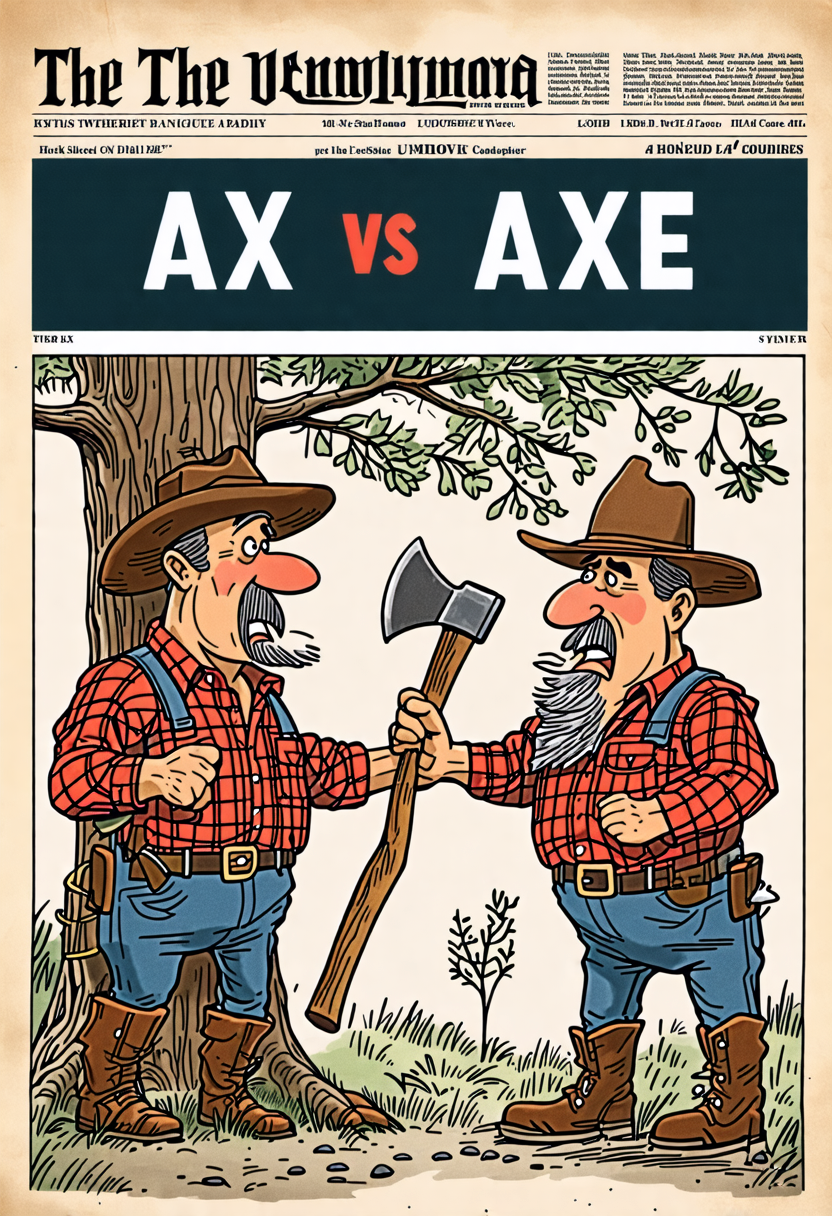Ax vs. Axe
The primary difference between “ax” and “axe” is regional spelling. “Ax” is the American English form, while “axe” is preferred in British English. Both spellings are accepted globally and often used interchangeably. ‘Axe’ can also refer to musical instruments in jazz and rock circles, like guitars. As a verb, “axe” means to abruptly cut or eliminate, often seen in phrases such as “to get the axe”. Additionally, compound names like “pickax” use the shorter spelling for simplicity.
Meaning of ‘Axe’
The term ‘axe’ encompasses several meanings, ranging from a tool for cutting and shaping stone to a slang term for musical instruments like guitars and saxophones.
In the context of tools, an axe is a hammer with a sharp edge, often used for dressing or spalling stone.
Musicians, on the other hand, refer to their instruments, especially guitars and saxophones, as ‘axes’.
Additionally, ‘axe’ serves as a verb, implying the abrupt removal or dismissal of something, such as cutting jobs or projects.
The word ‘axe’ also appears in compound names like pickax and poleax.
According to Garner’s Modern English Usage, ‘axe’ is approximately twice as common as the shorter form ‘ax’.
Meaning of ‘Ax’
In American English, ‘ax’ is commonly used as the shorter spelling for ‘axe’. This variant simplifies the spelling while retaining the same meaning. The primary usage of ‘ax’ is as a tool with a sharp blade for chopping wood or cutting through materials. It is essential in various professions, including forestry and carpentry. Below is a comparison of the two spellings:
| Aspect | ‘Ax’ | ‘Axe’ |
|---|---|---|
| Region | United States | International |
| Common Usage | Shorter form | Longer form |
| Frequency | Less common | More common |
| Compound Words | pickax, poleax | pickaxe, poleaxe |
| Professional Use | Forestry, Carpentry | Forestry, Carpentry |
Musical Instruments as Axes
Musicians often refer to their guitars or saxophones as ‘axes’ in casual conversation. This slang term has roots in the jazz and rock music communities.
For a guitarist, the ‘axe’ is a tool to create art, much like a painter uses a brush. The term conveys a sense of camaraderie among musicians, highlighting their craft. It also reflects the powerful and expressive nature of these instruments.
When a musician says they are ‘bringing their axe,’ it means they are ready to perform. This usage is informal but widely understood in the music world.
The metaphorical link between an axe and a musical instrument underscores the skill and precision required to master either.
‘Axe’ as a Verb
Frequently, ‘axe’ is used as a verb to describe the abrupt removal or termination of something. This usage typically involves cutting down or eliminating a program, service, or position.
For example, a company might ‘axe’ a project due to budget cuts, or an organization could ‘axe’ jobs in a restructuring effort. The term implies a sudden and decisive action, often viewed negatively by those affected.
In media and business contexts, ‘axing’ can refer to canceling shows, discontinuing products, or firing employees. This verb form emphasizes the swift and often harsh nature of the decision, reflecting the tool’s original purpose of cutting through materials efficiently and without hesitation.

Common Expressions
Common expressions involving ‘axe’ often carry metaphorical meanings that stem from its literal use.
For example, ‘an axe to grind’ suggests someone has a personal grievance or ulterior motive.
The phrase ‘to get the axe’ means to be fired or terminated, drawing from the image of an executioner’s axe.
A ‘battle axe’ historically referred to a weapon, but metaphorically, it describes a person, often a woman, who is perceived as aggressive or domineering. This term can be offensive.
These expressions showcase how the physical characteristics and uses of an axe have influenced language, embedding the tool into idiomatic phrases that convey broader, often negative, connotations.
Regional Spelling Differences
While idiomatic expressions involving ‘axe’ are rich in metaphor, the spelling of the word varies regionally. In American English, the shorter form ‘ax’ is more commonly used. This is supported by most U.S. dictionaries and is prevalent in everyday use.
However, outside the United States, particularly in British English, the longer form ‘axe’ is favored. Garner’s Modern English Usage notes that ‘axe’ is approximately twice as common as ‘ax’ globally. This variation in spelling highlights the regional differences in English language usage.
Despite these differences, both spellings are understood and accepted, with ‘ax’ being more concise and ‘axe’ retaining a traditional appearance in written English.
Spelling in Compound Names
In compound names like pickax and poleax, the shorter form ‘ax’ is generally preferred. This preference aligns with the trend in American English to favor shorter spellings for efficiency.
The use of ‘ax’ in compound terms simplifies the language without losing meaning. For example, ‘pickax’ describes a tool used for digging, while ‘poleax’ refers to an ancient weapon. These compound names maintain clarity and functionality despite the shorter spelling.
It’s important to note that while ‘ax’ is common in the U.S., the longer form ‘axe’ can still be found, particularly outside the United States. Understanding these variations helps in recognizing and using the correct form in different contexts.
Historical Significance
Axes have played a significant role in human history, serving as essential tools and formidable weapons. Their versatility made them indispensable in various civilizations.
Used for cutting wood, shaping materials, and in warfare, axes were crucial for survival and development. For instance, battle axes were common in medieval warfare, utilized for both hand-to-hand combat and throwing.
Key historical uses of axes include:
- Toolmaking: Essential for creating other tools and structures.
- Agriculture: Clearing land and processing wood.
- Warfare: Battle axes were prominent in medieval armies.
- Hunting: Used by early humans for hunting and skinning.
- Ceremonial: Symbolic in various cultures for rituals and status.
Etymology of Expressions
The phrase ‘an axe to grind’ likely originated from a story about sharpening a blade on a grindstone. This expression now represents someone having a personal motive or complaint. Historically, ‘to get the axe’ is linked to being fired, with roots tied to an executioner’s axe. The term ‘battle axe’ originally referred to a weapon but has evolved into a metaphor. These expressions have shifted from literal to metaphorical meanings over time.
Here is a table illustrating the etymology of these expressions:
| Expression | Origin | Current Meaning |
|---|---|---|
| An axe to grind | Sharpening a blade on a grindstone | Personal motive or complaint |
| To get the axe | Executioner’s axe | Being fired or expelled |
| Battle axe | Historical weapon | Metaphor for a controlling person |
Usage Trends
Understanding the usage trends of ‘ax’ and ‘axe’ reveals interesting regional and contextual preferences. While American English often favors ‘ax,’ British English mainly uses ‘axe.’ This discrepancy can be attributed to historical and cultural differences in spelling conventions. Additionally, the choice between ‘ax’ and ‘axe’ can depend on the context within specific expressions or compound words.
In the U.S., ‘ax’ is more common in general usage.
‘Axe’ is frequently seen in British publications.
Compound names like ‘pickaxe’ and ‘poleaxe’ usually use ‘axe.’
Garner’s Modern English Usage notes ‘axe’ is twice as common overall.
Context, such as formal writing versus casual use, influences the choice.
These trends highlight the fluidity and diversity in language.







